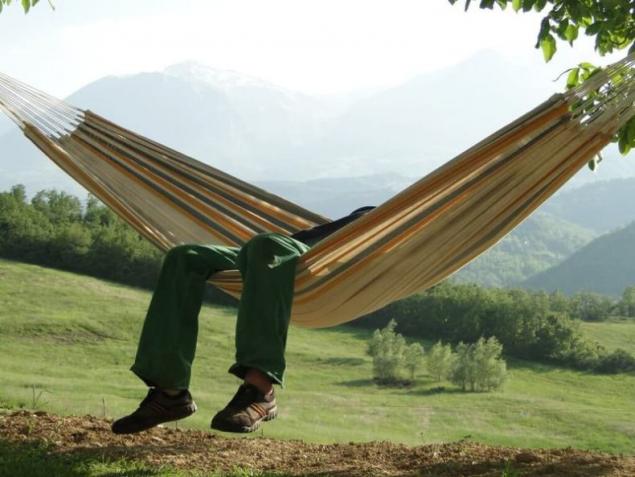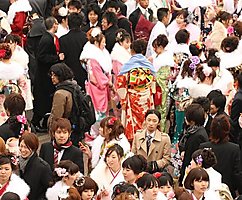Despair fatigue: how to relax in an era of manic workaholism
 Bashny.Net
Bashny.Net
Most of the people all of the time devote to work and leisure seems to be something obvious, nothing to learn.
The German philosopher Josef Pieper does not agree with this approach. In his book "Leisure, the basis of culture" he examines in detail, why between the output and the rest can not be equated, and what you need to do to gain strength. The arguments of the scientist commented American blogger Maria Popova. Published a translation of this material.

"We are so excited, anticipating fun, and so they hasten to meet that can't slow down and enjoy as it should, when they are available to us," said Alan watts in 1970, aptly calling us "a civilization which suffers from chronic disappointment."
Two millennia earlier Aristotle said, "the Main question is what occupation the person fills their leisure time".
Today, in a time when everybody is obsessed with productivity, we have been tyrannical to the concept of "balance work/life" and came to believe that the very idea of entertainment is not something necessary for the soul, but a selfish luxury, which is designed for the privileged strata, or shameful idleness, which can only afford lazy.
At the same time the most significant achievements of man since Aristotle to the present day — the greatest masterpieces of art, the immortal philosophical ideas, guesses that led to technological breakthroughs occurred in moments of leisure, unencumbered contemplation of the absolute presence of the Universe in someone's consciousness and the absolute attentiveness to life, whether Galileo Galilei, who invented the foundations of modern time measurement, when the swinging chandelier in the Cathedral or Oliver sacks, whose idea about the incredible impact of music on the brain visited when he traveled to the Norwegian fjords.

How we came to this contradictory relation to the culture of leisure?
In 1948, only a year after the appearance in Canada of the word "workaholic" and a year before American career consultant for the first time loudly and convincingly called for a review look at the work, the German philosopher Josef Pieper wrote, "Leisure the basis of culture" — a magnificent Manifesto of the return of human dignity in the era of manic workaholism that triple as relevant today, in times when we to the extent we identify our existence with the goods that mistakenly believe that in order to make a living — this means to live.
During the decades before the great Benedictine monk David Steindl-Rast began to think about why we stopped to rest and how to fix the situation, Pieper traces the etymology of the term "leisure" to its ancient roots, and illustrates just how amazingly distorted, even the opposite of its meaning has become over time: from the Greek word for "leisure" — σχoλη — there was the Latin "scola," and she, in turn, gave us the English "school" — our educational institutions, who are now preparing children for industrialisierung conformity for life, once planned as a Mecca of "leisure" and contemplation. Pieper writes:
"The original meaning of the concept "vacation" is almost forgotten in today's culture of constant work without a break: to really understand the essence of leisure, we must confront the contradiction that appears because of our excessive attention to the world of work.
The fact of this difference, our inability to restore the original value of "leisure" will amaze us even more, once we understand how broadly spread the opposite idea of "work" and how it subjugated all human actions and all human existence as a whole."
Pieper traces the origin of the paradigm of the word "employee" to the Greek philosopher and cynic of Antisana, friend of Plato and a follower of Socrates. As Pieper writes, being the first who equated the labor of virtue, he became the first workaholic:
"As ethics of independence, Antisthenes had no warm feelings for the holiday rituals that he chose to attack the "enlightened" wit, he was an "enemy of the muses" (poetry interested him only from the point of view of moral substance); he didn't care about Eros (he once said that he "wanted to kill Aphrodite,"); as a staunch realist, he didn't believe in immortality (which is really important, he said, is to live a moral life "on this earth"). This set of traits, it seems almost deliberately designed to illustrate the very type of the modern workaholic".
Work today includes "physical work", which consists of unskilled and technical labor, and "intellectual work"that Pieper defines this way: "intellectual activity as a social service, as contribution to the benefit of society." Together they constitute what he calls the "absolute work" — "the sequence of the victories of the majestic figure of the worker" archetype created by Antivenom. Under the yoke of the "absolute work" of human nature simplified to functions of the worker and the work becomes the beginning and the end of existence.
Pieper examines how such spiritual obliczania became commonplace:
"Work is the norm, and the normal day is a working day. But the question is: can the human world to get tired of the fact that he is a "working world"? Can a person be satisfied with the fact that he is a "worker"? Can the human existence be full, while being exceptionally humdrum existence?"
To answer this rhetorical question, you need to make a trip to another time in the history of our evolving — or, more precisely, regressing the understanding of "rest". Echoing Kierkegaard and his compelling defense of idleness as spiritual food, Pieper writes:
"The way of life in the classic middle Ages assumed that it was a lack of rest, inability to relax combined with the idleness that tireless "work for work's sake" derives solely from idleness. There is a curious connection in the fact that the restlessness of self-destructive bigotry of the work should arise from lack of desire to achieve any results.
In accordance with the older code of conduct, idleness meant that a person refused responsibility, which is inextricably linked with his dignity... Metaphysical-theological concept of idleness, therefore, suggests that the person is not at odds with its own existence, that if we discard all his energetic activity, it appears that he himself doesn't agree that, as expressed in the Middle ages, the sadness overcame him, in spite of the divine virtue in his soul".
We hear echoes of this view today in these extremely necessary but still raw concepts, such as the theology of rest, but Piper points to the Latin word "acedia" which can be loosely translated as "desperate weariness" as the earliest and the most appropriate wording of the complaint is self-destructive state. He cites the counter-argument:
"Contrast the notion of "acedia" is not a perseverance in the daily attempts to earn a living, and joyful recognition of man's own existence, the world in General, God and Love, that's where it comes down to that special freshness of action, which anyone who has faced a limiting framework of a workaholic, never be confused with anything.
Thus, leisure is a state of mind (and we should not forget about it, because the rest is not necessarily present in such surface phenomena as "break", "off", "weekend", "holiday" and so on — this is a state of mind). Rest helps to balance the image of a "worker".

But the most startling discovery of Piper, one of the enormous psychological and practical values today is his model three types of work:
1) work as an action
2) work effort
3) work as a contribution to the public good,
and the way the contrast with each of them opened new key aspects of leisure.
It starts with the first:
"The exclusiveness of the paradigm of work as opposed to leisure time actions as "omission" — the lack of internal concern, calmness, the ability to let go, to be peaceful".
The wonderful treatise of Pico Iyer on the art of peace, which will be written more than half a century later, Pieper adds:
"Leisure is a form of tranquility, which is necessary preparation for accepting reality; only those who are quiet, to hear, and who is not calm, he can not. This peace is not just absence of sound, or a dead muteness; rather, it indicates that strength of soul, as real, which is necessary for answering the present moment — this Duo forever approved nature — has not yet descended to words. Leisure is a combination of deep understanding, thoughtful contemplation and immersion in reality."
But there is something grander in this concept of leisure as inactivity is an opportunity to commune with the eternal mystery of existence. Pieper writes:
"In leisure, there is something of the serenity of that "impossible to comprehend", the recognition of the mysterious nature of the world and the conviction of blind faith, which allows things to run their course.
The rest is the attitude not the one who intervenes but of the one who opens it, not who grabs and the one who lets go, who lets go of themselves and "plunges", almost as someone who falls asleep must let go of itself... a Wave of new life that reaches us when we give ourselves to the contemplation of a blossoming rose, a sleeping child, or the divine mysteries — don't she look like the wave of life that comes from a deep, dreamless sleep?"
This paragraph looks like a wonderful meditation Janet Winterson about art as the process of "active surrender" is quite a sudden parallel, given the fact that the rest is a hothouse for the creative impulse is absolutely necessary for creativity and twice the necessary to enjoy them.
Pieper appeals to the second type of work, to work as a greedy attempt or diligence, and how the surrounding space represents another fundamental aspect of the holiday:
"In contrast to the exclusiveness of the paradigm of work as effort, leisure is a necessary condition in order to see things in a festive light. Inner joy of a person who is celebrating is one of the main conditions of what we call rest. Leisure becomes possible if the person is not only in harmony with himself, but in harmony with the world and its essence. The rest is a statement. It's not the same as the absence of activity. It's not the same as tranquility or even inner peace. It looks more like a calm in the conversation of two lovers, which is a result of their unity."
Here Pieper turns to the third and final type of work as a contribution to the public good:
"Leisure is opposed to the exclusiveness of the paradigm of work as social function. The usual "break" in the work, which lasts an hour or a week, or longer, is a part of normal working life. This is something that is built into the entire workflow, part of the schedule. "Break" is done for the sake of work. It needs to give "new strength" for "new works", as evidenced by the word "recovery": recovering people to work during her absence.
Leisure is perpendicular to the respect to the worker process... Stay there for the sake of work; no matter how many new powers does a man who resumes work: leisure in our understanding, it is impossible to justify upgrading the physical or even mental recovery for the emergence of new energy for further work... If someone needs to rest only to "restore", it will never taste the real fruit is a deep regeneration that occurs due to deep sleep".

According to Piper, back rest, his lofty goal is to return us to our humanity — a sense all the more needed today at a time when we talk about vacations as "digital detox", the consequence of which is that we are trying to get rid of dependence, but at the same time strengthen my desire even more zealous "digital intoxication" and doomed to her back. He writes:
"Rest is not justified by the fact that the employee is functioning in their time "without interruption" and minimum "downtime", but the fact that the worker remains a man... and that means he doesn't disappear in a fragmented on weekdays limited world of his everyday duties, but instead retains the ability to perceive the world in General, and means — to perceive yourself as being, which is aimed at wholeness of being.
That's why the ability to "relax" is one of the main spiritual forces of people. As the gift of contemplative introspection in Genesis and the ability to lift the mood fun, the ability to relax is the ability to go beyond the working world and get a reward contact with those superhuman life-giving forces that can bring us back, updated and re-live in a busy world of work...
The rest... a real man finds salvation and protection, because the area is "just human" is left behind... [But] the requirement utmost efforts easier to understand than the requirement of total relaxation and detachment, even despite the fact that the latter does not need to exert any effort; it is a paradox, which depends on the attainment of relaxation, simultaneously human and superhuman condition."
Perhaps that is why, when we take a real vacation — in the full meaning of the word "holiday" (in translation from eng. "holy" — "Holy, sacred", "day" — day. — Approx. TRANS.), a time marked by Holiness, a Holy period of respite — our sense of time completely change. Forgetting about the working hours and released, if not forever, from the tyranny of schedules, we can feel the life as it is, with full dynamic ebb and flow — sometimes slow and silky, as the quiet moments you spend relaxing in a hammock with a good book, and sometimes fast and hot, like a dance festival under the summer sky.published
P. S. And remember, only by changing their consumption — together we change the world! ©
Source: //theoryandpractice.ru/posts/15615-otchayanie-ot-ustalosti-kak-otdokhnut-v-epokhu-maniakalnogo-trudogolizma
The German philosopher Josef Pieper does not agree with this approach. In his book "Leisure, the basis of culture" he examines in detail, why between the output and the rest can not be equated, and what you need to do to gain strength. The arguments of the scientist commented American blogger Maria Popova. Published a translation of this material.

"We are so excited, anticipating fun, and so they hasten to meet that can't slow down and enjoy as it should, when they are available to us," said Alan watts in 1970, aptly calling us "a civilization which suffers from chronic disappointment."
Two millennia earlier Aristotle said, "the Main question is what occupation the person fills their leisure time".
Today, in a time when everybody is obsessed with productivity, we have been tyrannical to the concept of "balance work/life" and came to believe that the very idea of entertainment is not something necessary for the soul, but a selfish luxury, which is designed for the privileged strata, or shameful idleness, which can only afford lazy.
At the same time the most significant achievements of man since Aristotle to the present day — the greatest masterpieces of art, the immortal philosophical ideas, guesses that led to technological breakthroughs occurred in moments of leisure, unencumbered contemplation of the absolute presence of the Universe in someone's consciousness and the absolute attentiveness to life, whether Galileo Galilei, who invented the foundations of modern time measurement, when the swinging chandelier in the Cathedral or Oliver sacks, whose idea about the incredible impact of music on the brain visited when he traveled to the Norwegian fjords.

How we came to this contradictory relation to the culture of leisure?
In 1948, only a year after the appearance in Canada of the word "workaholic" and a year before American career consultant for the first time loudly and convincingly called for a review look at the work, the German philosopher Josef Pieper wrote, "Leisure the basis of culture" — a magnificent Manifesto of the return of human dignity in the era of manic workaholism that triple as relevant today, in times when we to the extent we identify our existence with the goods that mistakenly believe that in order to make a living — this means to live.
During the decades before the great Benedictine monk David Steindl-Rast began to think about why we stopped to rest and how to fix the situation, Pieper traces the etymology of the term "leisure" to its ancient roots, and illustrates just how amazingly distorted, even the opposite of its meaning has become over time: from the Greek word for "leisure" — σχoλη — there was the Latin "scola," and she, in turn, gave us the English "school" — our educational institutions, who are now preparing children for industrialisierung conformity for life, once planned as a Mecca of "leisure" and contemplation. Pieper writes:
"The original meaning of the concept "vacation" is almost forgotten in today's culture of constant work without a break: to really understand the essence of leisure, we must confront the contradiction that appears because of our excessive attention to the world of work.
The fact of this difference, our inability to restore the original value of "leisure" will amaze us even more, once we understand how broadly spread the opposite idea of "work" and how it subjugated all human actions and all human existence as a whole."
Pieper traces the origin of the paradigm of the word "employee" to the Greek philosopher and cynic of Antisana, friend of Plato and a follower of Socrates. As Pieper writes, being the first who equated the labor of virtue, he became the first workaholic:
"As ethics of independence, Antisthenes had no warm feelings for the holiday rituals that he chose to attack the "enlightened" wit, he was an "enemy of the muses" (poetry interested him only from the point of view of moral substance); he didn't care about Eros (he once said that he "wanted to kill Aphrodite,"); as a staunch realist, he didn't believe in immortality (which is really important, he said, is to live a moral life "on this earth"). This set of traits, it seems almost deliberately designed to illustrate the very type of the modern workaholic".
Work today includes "physical work", which consists of unskilled and technical labor, and "intellectual work"that Pieper defines this way: "intellectual activity as a social service, as contribution to the benefit of society." Together they constitute what he calls the "absolute work" — "the sequence of the victories of the majestic figure of the worker" archetype created by Antivenom. Under the yoke of the "absolute work" of human nature simplified to functions of the worker and the work becomes the beginning and the end of existence.
Pieper examines how such spiritual obliczania became commonplace:
"Work is the norm, and the normal day is a working day. But the question is: can the human world to get tired of the fact that he is a "working world"? Can a person be satisfied with the fact that he is a "worker"? Can the human existence be full, while being exceptionally humdrum existence?"
To answer this rhetorical question, you need to make a trip to another time in the history of our evolving — or, more precisely, regressing the understanding of "rest". Echoing Kierkegaard and his compelling defense of idleness as spiritual food, Pieper writes:
"The way of life in the classic middle Ages assumed that it was a lack of rest, inability to relax combined with the idleness that tireless "work for work's sake" derives solely from idleness. There is a curious connection in the fact that the restlessness of self-destructive bigotry of the work should arise from lack of desire to achieve any results.
In accordance with the older code of conduct, idleness meant that a person refused responsibility, which is inextricably linked with his dignity... Metaphysical-theological concept of idleness, therefore, suggests that the person is not at odds with its own existence, that if we discard all his energetic activity, it appears that he himself doesn't agree that, as expressed in the Middle ages, the sadness overcame him, in spite of the divine virtue in his soul".
We hear echoes of this view today in these extremely necessary but still raw concepts, such as the theology of rest, but Piper points to the Latin word "acedia" which can be loosely translated as "desperate weariness" as the earliest and the most appropriate wording of the complaint is self-destructive state. He cites the counter-argument:
"Contrast the notion of "acedia" is not a perseverance in the daily attempts to earn a living, and joyful recognition of man's own existence, the world in General, God and Love, that's where it comes down to that special freshness of action, which anyone who has faced a limiting framework of a workaholic, never be confused with anything.
Thus, leisure is a state of mind (and we should not forget about it, because the rest is not necessarily present in such surface phenomena as "break", "off", "weekend", "holiday" and so on — this is a state of mind). Rest helps to balance the image of a "worker".

But the most startling discovery of Piper, one of the enormous psychological and practical values today is his model three types of work:
1) work as an action
2) work effort
3) work as a contribution to the public good,
and the way the contrast with each of them opened new key aspects of leisure.
It starts with the first:
"The exclusiveness of the paradigm of work as opposed to leisure time actions as "omission" — the lack of internal concern, calmness, the ability to let go, to be peaceful".
The wonderful treatise of Pico Iyer on the art of peace, which will be written more than half a century later, Pieper adds:
"Leisure is a form of tranquility, which is necessary preparation for accepting reality; only those who are quiet, to hear, and who is not calm, he can not. This peace is not just absence of sound, or a dead muteness; rather, it indicates that strength of soul, as real, which is necessary for answering the present moment — this Duo forever approved nature — has not yet descended to words. Leisure is a combination of deep understanding, thoughtful contemplation and immersion in reality."
But there is something grander in this concept of leisure as inactivity is an opportunity to commune with the eternal mystery of existence. Pieper writes:
"In leisure, there is something of the serenity of that "impossible to comprehend", the recognition of the mysterious nature of the world and the conviction of blind faith, which allows things to run their course.
The rest is the attitude not the one who intervenes but of the one who opens it, not who grabs and the one who lets go, who lets go of themselves and "plunges", almost as someone who falls asleep must let go of itself... a Wave of new life that reaches us when we give ourselves to the contemplation of a blossoming rose, a sleeping child, or the divine mysteries — don't she look like the wave of life that comes from a deep, dreamless sleep?"
This paragraph looks like a wonderful meditation Janet Winterson about art as the process of "active surrender" is quite a sudden parallel, given the fact that the rest is a hothouse for the creative impulse is absolutely necessary for creativity and twice the necessary to enjoy them.
Pieper appeals to the second type of work, to work as a greedy attempt or diligence, and how the surrounding space represents another fundamental aspect of the holiday:
"In contrast to the exclusiveness of the paradigm of work as effort, leisure is a necessary condition in order to see things in a festive light. Inner joy of a person who is celebrating is one of the main conditions of what we call rest. Leisure becomes possible if the person is not only in harmony with himself, but in harmony with the world and its essence. The rest is a statement. It's not the same as the absence of activity. It's not the same as tranquility or even inner peace. It looks more like a calm in the conversation of two lovers, which is a result of their unity."
Here Pieper turns to the third and final type of work as a contribution to the public good:
"Leisure is opposed to the exclusiveness of the paradigm of work as social function. The usual "break" in the work, which lasts an hour or a week, or longer, is a part of normal working life. This is something that is built into the entire workflow, part of the schedule. "Break" is done for the sake of work. It needs to give "new strength" for "new works", as evidenced by the word "recovery": recovering people to work during her absence.
Leisure is perpendicular to the respect to the worker process... Stay there for the sake of work; no matter how many new powers does a man who resumes work: leisure in our understanding, it is impossible to justify upgrading the physical or even mental recovery for the emergence of new energy for further work... If someone needs to rest only to "restore", it will never taste the real fruit is a deep regeneration that occurs due to deep sleep".

According to Piper, back rest, his lofty goal is to return us to our humanity — a sense all the more needed today at a time when we talk about vacations as "digital detox", the consequence of which is that we are trying to get rid of dependence, but at the same time strengthen my desire even more zealous "digital intoxication" and doomed to her back. He writes:
"Rest is not justified by the fact that the employee is functioning in their time "without interruption" and minimum "downtime", but the fact that the worker remains a man... and that means he doesn't disappear in a fragmented on weekdays limited world of his everyday duties, but instead retains the ability to perceive the world in General, and means — to perceive yourself as being, which is aimed at wholeness of being.
That's why the ability to "relax" is one of the main spiritual forces of people. As the gift of contemplative introspection in Genesis and the ability to lift the mood fun, the ability to relax is the ability to go beyond the working world and get a reward contact with those superhuman life-giving forces that can bring us back, updated and re-live in a busy world of work...
The rest... a real man finds salvation and protection, because the area is "just human" is left behind... [But] the requirement utmost efforts easier to understand than the requirement of total relaxation and detachment, even despite the fact that the latter does not need to exert any effort; it is a paradox, which depends on the attainment of relaxation, simultaneously human and superhuman condition."
Perhaps that is why, when we take a real vacation — in the full meaning of the word "holiday" (in translation from eng. "holy" — "Holy, sacred", "day" — day. — Approx. TRANS.), a time marked by Holiness, a Holy period of respite — our sense of time completely change. Forgetting about the working hours and released, if not forever, from the tyranny of schedules, we can feel the life as it is, with full dynamic ebb and flow — sometimes slow and silky, as the quiet moments you spend relaxing in a hammock with a good book, and sometimes fast and hot, like a dance festival under the summer sky.published
P. S. And remember, only by changing their consumption — together we change the world! ©
Source: //theoryandpractice.ru/posts/15615-otchayanie-ot-ustalosti-kak-otdokhnut-v-epokhu-maniakalnogo-trudogolizma
Tags
See also
How to do accounting in online store
Men and Women: stage of development
Maybe, probably Yes, sometime
Germans vs Chinese
About winter in Germany
17 enemies of femininity: Winning is what prevents you to live normally.

















